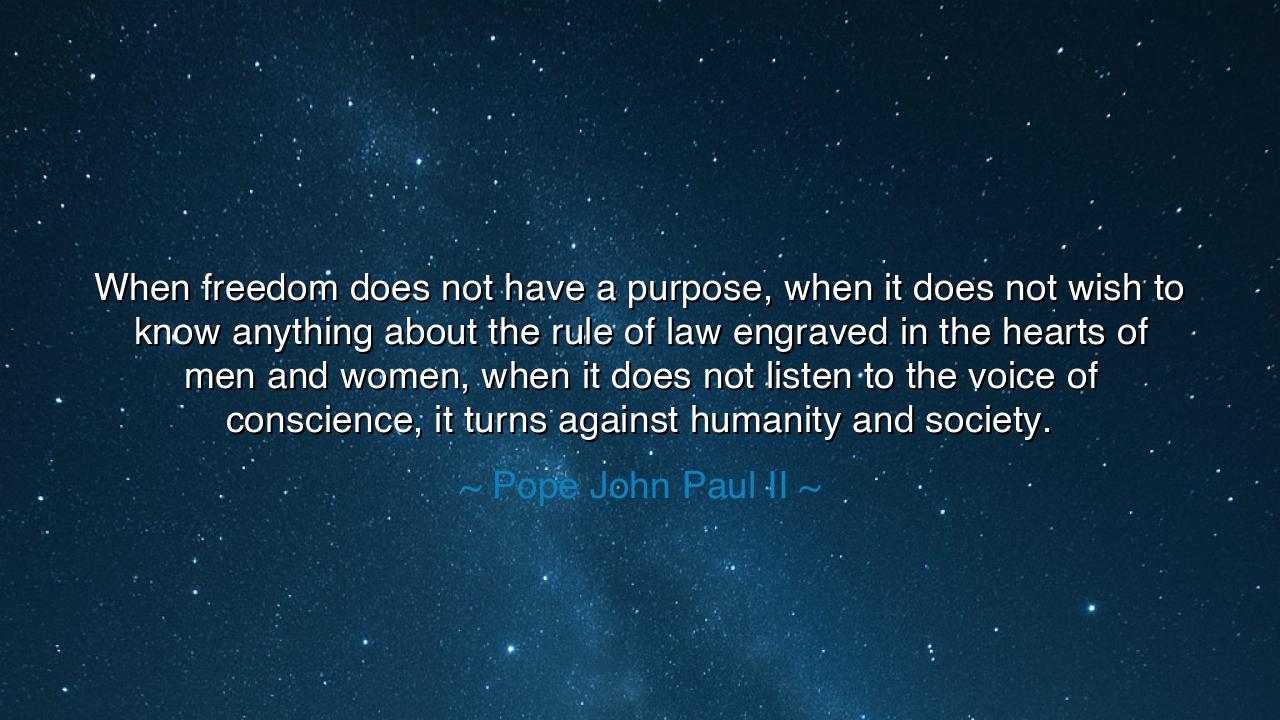
When freedom does not have a purpose, when it does not wish to
When freedom does not have a purpose, when it does not wish to know anything about the rule of law engraved in the hearts of men and women, when it does not listen to the voice of conscience, it turns against humanity and society.






Yes — that quote is correctly attributed to Pope John Paul II, the 264th pope of the Catholic Church, who served from 1978 until his death in 2005.
“When freedom does not have a purpose, when it does not wish to know anything about the rule of law engraved in the hearts of men and women, when it does not listen to the voice of conscience, it turns against humanity and society.”
— Pope John Paul II
Context and Background
This quote reflects **Pope John Paul II’s views on the relationship between freedom, morality, and responsibility. Throughout his papacy, John Paul II emphasized the importance of human dignity, ethics, and moral law as guiding principles for personal and societal freedom. He warned against the dangers of unbridled freedom, where individuals pursue personal desires without regard for the common good, justice, or ethical responsibility.
In the context of his writings and speeches, this quote speaks to the importance of moral grounding and conscience in ensuring that freedom does not become self-destructive or harmful to society.
Interpretation
-
“When freedom does not have a purpose” — John Paul II suggests that freedom is not simply the ability to act without restraint, but must be directed toward a higher purpose, such as justice, love, and human dignity.
-
“When it does not wish to know anything about the rule of law engraved in the hearts of men and women” — he emphasizes that true freedom requires an awareness of the moral law or natural law, which he believed is intrinsic to human nature and guides our decisions and actions.
-
“When it does not listen to the voice of conscience” — true freedom is not just about following one’s desires but about listening to one’s moral conscience, which helps determine what is just and right.
-
“It turns against humanity and society” — without moral direction, freedom can become harmful, leading to selfishness, social fragmentation, and disorder. This could result in societal collapse and the undermining of human dignity.
Summary
Pope John Paul II’s quote underscores his belief that freedom is not just an absence of restrictions but must be guided by purpose, moral values, and conscience. Without these principles, freedom can become dangerous and destructive, ultimately harming both the individual and society. For John Paul II, true freedom is aligned with moral responsibility and should always be exercised within the framework of justice, human dignity, and ethical law.






AAdministratorAdministrator
Welcome, honored guests. Please leave a comment, we will respond soon